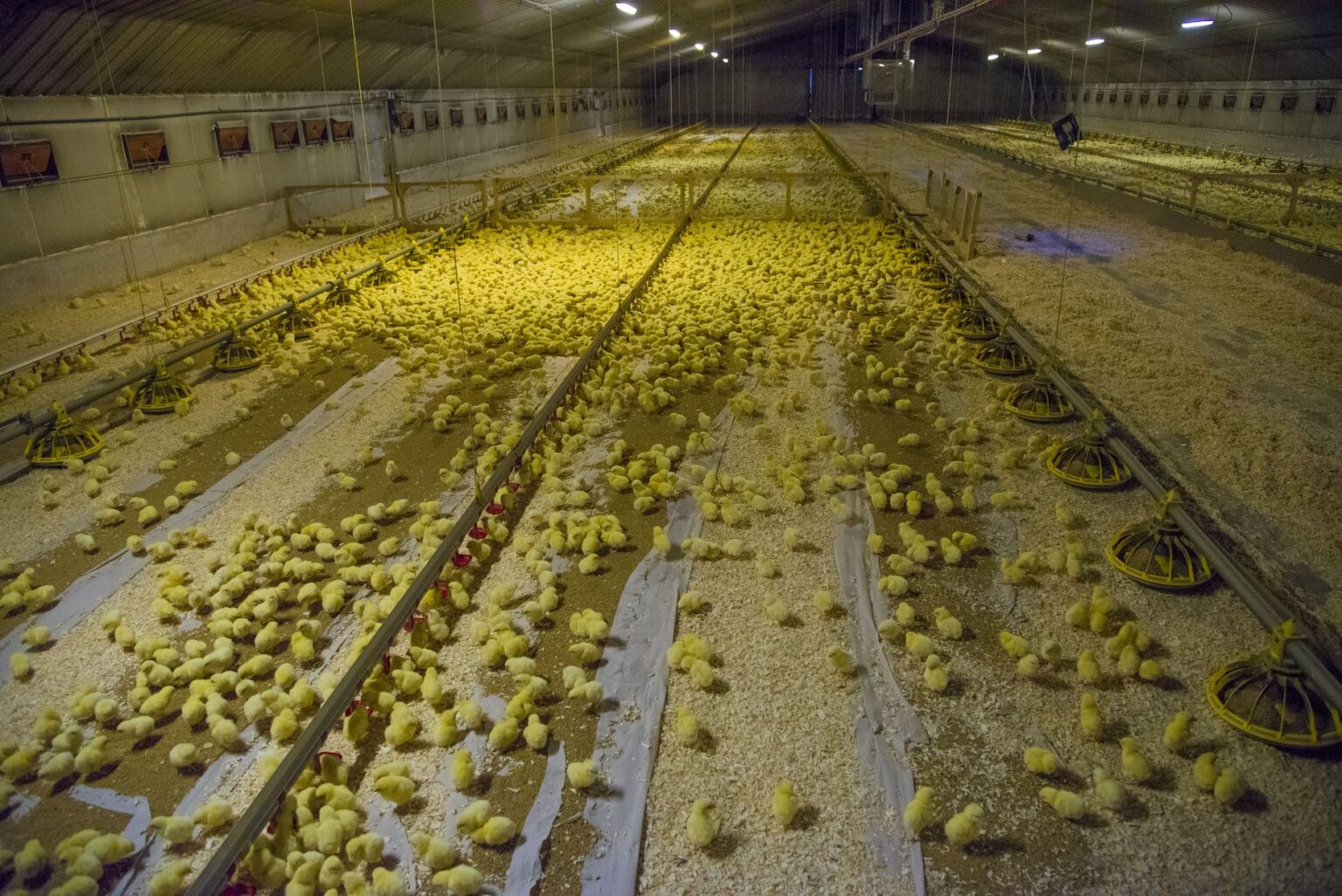Plans for intensive livestock “megafarms” are omitting crucial climate impacts, it can be revealed.
Campaigners last year celebrated a “beginning of the end” to polluting factory farming, after the landmark Finch Supreme Court ruling on a Surrey oil well confirmed that applications for major developments should consider all significant direct and indirect greenhouse gas emissions.
However, a review of 35 proposed developments across the UK’s largest farming counties since the June 2024 ruling found that applications routinely ignored or downplayed the industry’s carbon footprint.
The research by advocacy group Sustain, which was analysed by DeSmog and The Guardian, looked at all applications for Herefordshire, Lincolnshire, Norfolk, Suffolk, Nottinghamshire, Shropshire, Yorkshire, Wales and Northern Ireland which were under consideration by local councils between the 2024 ruling and September this year.
Farms housing more than 900 sows, 3,000 pigs, 60,000 hens for eggs, or 85,000 chickens for meat are required to provide information on expected environmental impacts under UK law when applying for planning permission.

A version of this story was published by The Guardian
The applications reviewed were mainly submitted by UK-based farm companies, but some came from major meat producers — including Crown Chicken, a subsidiary of Cranswick, which is one of the largest meat companies in Europe and slaughters nearly 60 million birds a year. Cranswick was responsible for three million tonnes of carbon dioxide emissions in 2024.
If these were all accepted for development, an additional 30,000 pigs and nearly five million chickens would be farmed across England, Northern Ireland and Wales — amounting to over 37 million additional animals reared in the UK each year.
Intensive pig and poultry farms are high emitters of methane and nitrous oxide, potent greenhouse gases that cause around 30 and 300 times more global warming than carbon dioxide over a 100 year period. According to Sustain’s estimates, if all the applications analysed were approved this could generate an estimated 634,000 tonnes of CO2-equivalent emissions annually — the equivalent of 488,000 return flights from London to New York.
Subscribe to our newsletter
Stay up to date with DeSmog news and alerts
None of the 35 applications provided figures on likely emissions from the farm, meaning local councils — which have the ultimate say on developments — are not factoring in climate harms in planning decisions. Government policies say that local planning should support the country’s goal to reach net zero by 2050.
The findings come as numbers of intensive livestock farms increase across Europe. More than 1,500 industrial-scale pig and poultry farms operating in the UK.
“Vital information is being kept from councils and the public,” Ruth Westcott, campaign manager at Sustain, told DeSmog.
“It’s clear that agribusinesses don’t want to come clean about the pollution they cause because it could affect whether they are allowed to expand, and thus make more profits at the expense of our communities,” they added. “It’s an emissions scandal.
‘Devastating’
Councils are facing growing pressure from residents to refuse planning permission to companies which fail to robustly assess climate impacts.
In April, following public pressure, King’s Lynn & West Norfolk Borough Council denied planning permission for the Methwold megafarm that would have housed almost 900,000 chickens and pigs, partly due to its lack of climate assessment — making it the first-known refusal on these grounds.
Breckland Council in Norfolk likewise refused planning permission to the controversial Cherry Tree Farm in October, in part because it had not provided an updated environmental impact assessment, including “project-specific carbon emissions”. The farm — which is owned by Wayland Farms, also a subsidiary of the livestock giant Cranswick — was forced to apply for retrospective approval for previously completed construction. Local residents had made major complaints over the “stench” following its expansion in 2019.
In total, four of the applications reviewed have been refused so far – three of which were submitted by Cranswick. When asked by DeSmog about the lack of climate data in its applications, the company declined to comment.
However, other councils in Norfolk, Nottinghamshire, Suffolk, Lincolnshire and Yorkshire have approved six farms that have not provided any specific information on the farm’s climate impacts in the last 12 months, the new research shows.
Councils which responded to DeSmog’s request for comment said they had complied with planning regulations, and that they were unable to comment on individual planning applications.
Farms currently seeking planning permission supply some of the largest meat producers in the country, such as Hook2Sisters and Avara Foods.
Avara is estimated to have 33 million chickens in the UK at any one time and sells its products to well-known brands including McDonald’s and Tesco. The company — which is part-owned by Cargill, the third largest meat company in the world — was responsible for more than one million tonnes of carbon dioxide emissions in 2023, equivalent to those from 2.3 million barrels of oil.
Over half (57 percent) of the planning applications reviewed were for major extensions and alterations, and the remainder for new farms.
Jan Palmer — a resident of Methwold village in Norfolk who campaigned against the Cranswick megafarm that was denied planning permission in April — has called for greater scrutiny of impacts from proposed farms.
“These are industrial developments. It’s called industrial farming, and it has industrial emissions,” she said. “If my local megafarm application hadn’t been so fiercely challenged and by so many, it would’ve slipped through the system like so many others do – quietly and without scrutiny but with devastating consequences.”
Growing Legal Challenge
Companies seeking permission for any large-scale developments — ranging from motorways and oil and gas extraction sites to intensive farms — are required to conduct environmental impact assessments showing the likely affects of developments on biodiversity, the climate, and other environmental factors.
Applications for intensive livestock farms routinely include information on issues such as air pollutants and unpleasant smells, the review showed. However, the vast majority of applications overlooked climate impacts.
Of the applications reviewed, 35 percent mentioned the farm’s operations only in passing, while 55 percent did not discuss these climate impacts at all.
Large projects must assess all “significant environmental impacts” under UK planning law. Lawyers told DeSmog that few cases had so far tested the threshold for “significant” climate impacts from farms in the courts, but given the “well-documented” emissions from intensive farming, applications could face growing challenges in coming years.
“Where the companies are not assessing their climate impacts, they may be open to legal challenge,” said Ricardo Gama, an environmental lawyer at Leigh Day solicitors. “Agriculture has flown under the radar on so many of these issues, but I think that is changing.”
‘Negligible’
Over the past year, six local councils have granted permission to applications without any assessment of the farms’ likely emissions, as well as one that granted permission to a farm with only passing discussion, the research shows.
West Lindsey Council in Lincolnshire — the fastest growing county for intensive livestock farming — approved planning for the Happylands Farm in North Owersby earlier this year, which will see the number of pigs increase by 1,300 to total almost 4,000. The application form did not provide any information about the likely emissions from the farm.
If all the applications in Lincolnshire are approved, it will see an extra 6,500 pigs and almost 13 million chickens farmed there each year.
Similar applications have been approved in Norfolk, Suffolk, Nottinghamshire, and Yorkshire. Planning authorities have an obligation to consider all relevant environmental impacts before granting permission, according to legal experts.
While applicants propose which environmental impacts should be assessed as part of planning applications, it is the council’s legal responsibility to ensure that all “significant” effects are covered and that adequate information on these is provided, before granting planning permission.
“When the council or the inspector or the secretary of state is considering whether to grant planning permission, climate impacts need to be weighed in the balance,” Gama said. “I think councils’ approach will change as the public becomes more aware of the climate impact of agriculture.”
Kevin Bunn, a resident of Spalding in Lincolnshire, said that companies were “so used to them [planing applications]flying through under the radar without any proper scrutiny.”
“I don’t believe that it should be a foregone conclusion for an authority to accept something that is so detrimental to an area,” he told DeSmog. “The council should be there to preserve and protect the environment of the local residents.”
Bunn is campaigning against a planning application for a new poultry farm that would house more than half a million chickens in the village of Whaplode Drove. He said that more than 1,800 people had lodged objections against the farm during public consultations. “As single residents, people didn’t feel they had a voice, but when they came together collectively, they did.”
A spokesperson for West Lindsey Council told DeSmog that each application was “assessed against national and local policy requirements, statutory provisions including where appropriate an environmental statement, and material planning considerations”. Together, these helped the council come to “a reasoned decision that carefully balances the competing issues to ensure a fair and lawful process”.
Misleading Claims
Applications for livestock farms which did raise general climate impacts from the wider sector repeatedly downplayed harms.
More than a dozen of the applications reviewed included environmental assessments by the planning consultancy firm Harrison Pick, with near-identical statements on climate, including that “Current poultry production in the UK is responsible for a fraction of the greenhouse gas emissions associated with red meat production”.
Cattle farming is the number one cause of agricultural emissions in the UK, but intensive pig and poultry farming have far higher emissions than crops. A serving of chicken has a sixth of the carbon footprint of beef, but around ten times that of tofu or beans.
A spokesperson for Harrison Pick said they had “consistently complied with the scope and requirements set by local planning authorities” and that the application of the Finch ruling in livestock was an “evolving area”. They denied that their assessments “downplay” climate impacts.
It was the responsibility of the local planning authority to provide additional information “directly relevant to assessing the likely significant effects of the project”, they said, adding that they had not yet received any requests requiring further information on climate change impacts.
The research found that environmental assessments also repeatedly failed to discuss emissions that did not directly arise on the farms. Of the 35 applications reviewed, just one included information on the farm’s likely emissions from animal feed — the largest source of greenhouse gases for both big and poultry.
The majority of pigs and chickens in the UK are fed soy, which is one of the biggest drivers of deforestation in regions such as the Amazon. According to campaign group WWF, the UK’s demand for soy requires more than 1.7 millionhectares of land each year — an area larger than Northern Ireland.
Other applications also contained misleading claims. An environmental impact assessment for the expansion of a poultry megafarm currently under consideration in Shropshire — which would increase its total number of birds to up to 350,000— stated that carbon dioxide emitted from the development would be offset “due to the reduction in emissions from transporting poultry meat from elsewhere”. It continued: “Increasing the amount of home produced poultry meat will reduce the need for importing meat from abroad and hence help to reduce the level of transportation required.”
Transportation accounts for between just five and seven percent of total emissions from chicken reared in the UK.
A Shropshire Council spokesperson said applications were processed “in accordance with [EIA] regulations”, which included taking into account direct and indirect effects of the proposed development on the environment.
All councils, farm companies and meat producers referenced in this article were approached for comment.
Ruth Westcott from Sustain called on local councils to reject planning permission for farms failing to declare their emissions.
“The government must stop this industry from getting away with devastating pollution,” they said. “We need full environmental assessments for every facility, no new factories in already polluted areas, and proper enforcement when rules are broken.”
Subscribe to our newsletter
Stay up to date with DeSmog news and alerts






